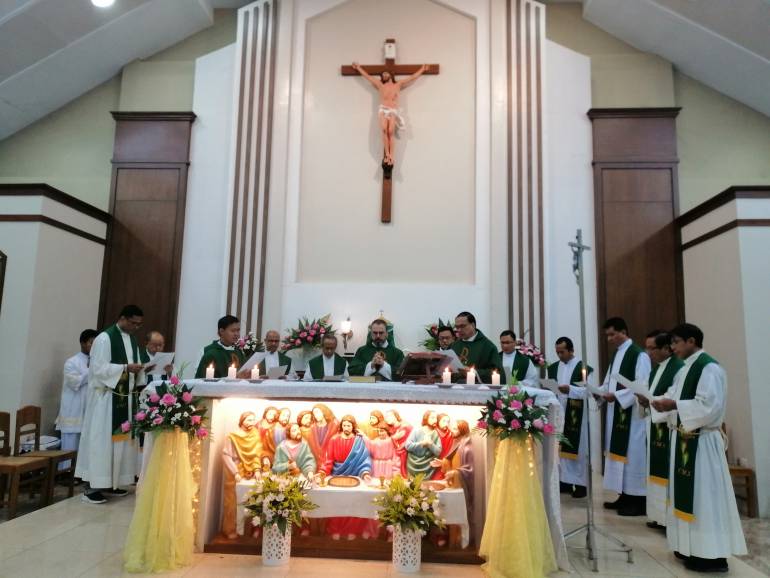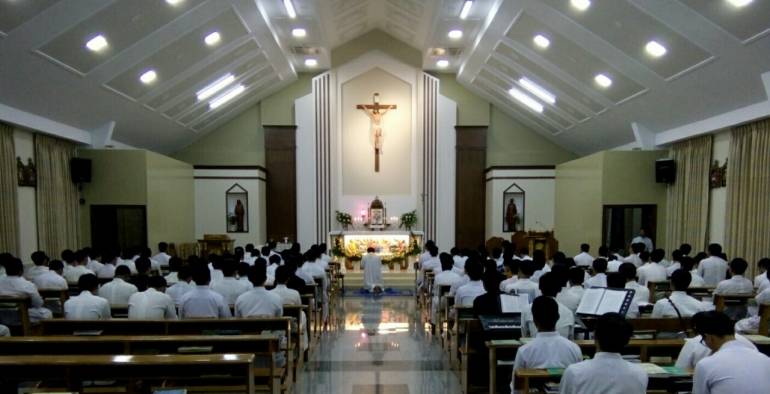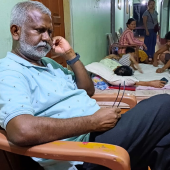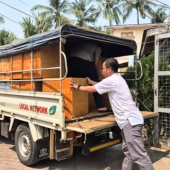Yangon Major Seminarians urged to cultivate courage of authenticity

The Vatican representative to Myanmar, Msgr. Andrea Ferrante, urged the seminarians of St Joseph’s Catholic Major Seminary, to cultivate courage of authenticity in order to make Jesus known through witness, fraternity and dialogue.
Msgr. Andrea Ferrante, Chargé d'affaires from the Holy See to Myanmar, was speaking to the professors and students of Institute of Theology at the St Joseph’s Catholic Major Seminary of Theology in Yangon, Myanmar, at the resumption of the academic year on January 23.
“The Lord invites us to open our hearts, to let His grace embrace us, and to walk with Him in our concrete lives to bear fruits of peace, unity, and joy in the faith, hope, and charity,” Msgr. Andrea Ferrante said in his homily, presiding over the opening mass.
Regarding priestly formation, Msgr. Ferrante presented the passages from Pope Francis concerning three important characteristics and challenges to be cultivated and strengthened at the time of initial formation, in order to be true missionary disciples.
The first characteristic is the courage of authenticity. Our closeness to God and to our brothers is achieved and strengthened to the extent that we have the courage to take off the masks we wear.
The second characteristic is the capacity to come out of oneself. The life of faith is an exit from our mindsets, from the enclosure of our fears, from the small certainties that reassure us.
And, the last characteristic is openness to dialogue: to dialogue with God, in prayer, which is an exodus from our ego to welcome him. And then to fraternal dialogue, in radical openness to the other.
The first challenge is "to make Jesus known." In the spiritual deserts of our time, it is necessary to return to the initial proclamation, to reach people where they live, not wait for them to come, and to return to the essentiality of the Christian being.
The second challenge is “witness”: The Gospel is effectively proclaimed when it is the life that speaks when it reveals that freedom that sets others free, that compassion that asks nothing in return, that mercy that without words speaks of Christ. That is why we are called to be docile and willing servants, builders of peace and unity.
The third challenge is “fraternity”. We will be credible Gospel witnesses if we embody communion and provide a welcoming community that listens to dialogues, and promotes a new humanity.
He insisted, “These characteristics and challenges are not things to do, but describe our Christian being; they are the fruits of Baptism that grow and develop in the discipleship of Christ. We need to be guided by the power of the Holy Spirit, whom we must always invoke in prayer.”

He conveyed the fatherly greetings of Pope Francis to the professors and seminarians of St. Joseph Catholic Major Seminary.
Msgr. Ferrante said, “Pope Francis follows with fatherly concern and prays for the Church in Myanmar.”
The Pope recalled Myanmar, “My thoughts, with sorrow, go in particular to Myanmar, where the Church of Our Lady of the Assumption in the village of Chan Thar, one of the oldest and most important places of worship in the country, was set on fire and destroyed.”
“I am close to the defenseless civilian population, which in many cities is under severe trial. May God bring an end to this conflict soon and open a new time of forgiveness, love and peace,” Pope Francis added.
Msgr. Ferrante remarked that this was a very strong appeal that the Pope had made for Myanmar. His closeness to the people of Myanmar testified that they are not abandoned.
Msgr. Ferrante invited all to entrust themselves to the maternal protection of Mary.
The rector and professors made their profession of faith on the very first day of the academic year.
The total number of Major Seminarians in this academic year is 61. The academic year will come to a close in October 2023.
It is already the second year that seminarians could come back to Major Seminary after the Covid-19 pandemic. - By Hubert Saw
Radio Veritas Asia (RVA), a media platform of the Catholic Church, aims to share Christ. RVA started in 1969 as a continental Catholic radio station to serve Asian countries in their respective local language, thus earning the tag “the Voice of Asian Christianity.” Responding to the emerging context, RVA embraced media platforms to connect with the global Asian audience via its 21 language websites and various social media platforms.














